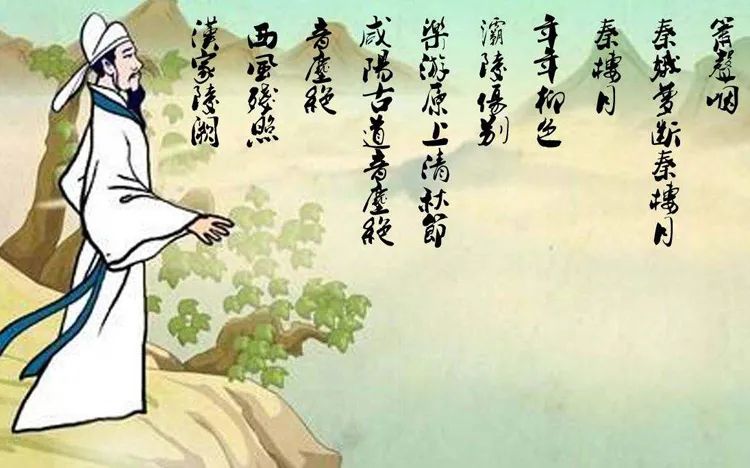He played the sad lyre
- Poetry of Li Bai (Li Po)

He played the sad lyre,
moonshine washed the spire.
girl woke up to see the willow leaves,
only the spring wind breezes.
Thought back that autumn on Happy Valley,
he read the love poems for her in alley.
Now west wind came here with the heartbroken air.
In front of his tomb,girl silently played the sweet lyre.
This lyric depicts the solitude of a young woman who wakes from a dream of her husband on the eve of Clear Autumn Day or Mountain-climbing Day,that is,the 9th day of the 9th lunar month. It recalls his parting with her at the Bridge east of the capital.She then goes to the Merry-making Plain where she waits until sunset without seeing a messenger coming from her husband.Another commentator says that the people taking leave were those who were going to the war against the rebels in 755,so this lyric predicted the decline and fall of the Tang Empire.
箫声咽,秦娥梦断秦楼月。
秦楼月,年年柳色,灞陵伤别。
乐游原上清秋节,咸阳古道音尘绝。
音尘绝,西风残照,汉家陵阙。
- Why Chinese poems is so special?
- The most distinctive features of Chinese poetry are: concision- many poems are only four lines, and few are much longer than eight; ambiguity- number, tense and parts of speech are often undetermined, creating particularly rich interpretative possibilities; and structure- most poems follow quite strict formal patterns which have beauty in themselves as well as highlighting meaningful contrasts.
- How to read a Chinese poem?
- Like an English poem, but more so. Everything is there for a reason, so try to find that reason. Think about all the possible connotations, and be aware of the different possibilities of number and tense. Look for contrasts: within lines, between the lines of each couplet and between successive couplets. Above all, don't worry about what the poet meant- find your meaning.
- Consoling Myself
- Song of Qiupu XV
- Song of Qiupu XIV
- Song of Qiupu XIII
- Song of Qiupu XII
- Sobering from Drunkenness in Spring Day
- Lodging with the Master of the Clear Stream
- An Impromptu Verse After Being Drunk on Tongguan Mountain
- Song of a Southern Maiden: Winter
- Staying Overnight with a Friend